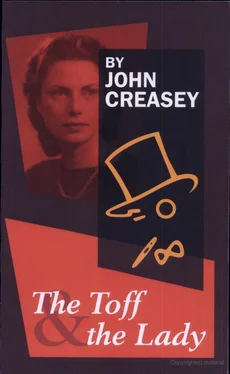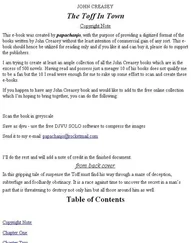John Creasey - The Toff and The Lady
Здесь есть возможность читать онлайн «John Creasey - The Toff and The Lady» весь текст электронной книги совершенно бесплатно (целиком полную версию без сокращений). В некоторых случаях можно слушать аудио, скачать через торрент в формате fb2 и присутствует краткое содержание. Жанр: Старинная литература, на русском языке. Описание произведения, (предисловие) а так же отзывы посетителей доступны на портале библиотеки ЛибКат.
- Название:The Toff and The Lady
- Автор:
- Жанр:
- Год:неизвестен
- ISBN:нет данных
- Рейтинг книги:5 / 5. Голосов: 1
-
Избранное:Добавить в избранное
- Отзывы:
-
Ваша оценка:
- 100
- 1
- 2
- 3
- 4
- 5
The Toff and The Lady: краткое содержание, описание и аннотация
Предлагаем к чтению аннотацию, описание, краткое содержание или предисловие (зависит от того, что написал сам автор книги «The Toff and The Lady»). Если вы не нашли необходимую информацию о книге — напишите в комментариях, мы постараемся отыскать её.
The Toff and The Lady — читать онлайн бесплатно полную книгу (весь текст) целиком
Ниже представлен текст книги, разбитый по страницам. Система сохранения места последней прочитанной страницы, позволяет с удобством читать онлайн бесплатно книгу «The Toff and The Lady», без необходимости каждый раз заново искать на чём Вы остановились. Поставьте закладку, и сможете в любой момент перейти на страницу, на которой закончили чтение.
Интервал:
Закладка:
Renfrew had been desperately hard up, and so had Gwendoline, who received an allowance ample for her own needs but ridiculously small for his. His practice was small, for he had not been in Wimpole Street long, the expenses were enormous, his personal extravagance unlimited . . . .
Barrington-Ley would not increase his daughter’s allowance. Perhaps, thought Rollison, as he listened, David had some idea of the depths of evil that was in his daughter. She had evolved the plan to kill first Hilda and then her father; with Renfrew’s help it should be easy, he could have signed the death certificates. Had the plot not spread wider, they might have succeeded and now be living in luxury. But into the black plot came Pomeroy, fat and genial and garrulous, and above all dangerous. He came first because a company to whom Renfrew owed money had put the account into his hands. He appeared helpful and sympathetic and offered to advance money on expectations, and Renfrew told him of
Gwendoline and his hopes. Skilfully Pomeroy had drawn out of them the idea of murder, played on the theme and developed it; then whenever Renfrew showed signs of reluctance, used pressure because he knew the whole of Renfrew’s financial plight.
In all of this, Gwendoline supported Pomeroy.
Pomeroy, keeping in the background at the Strand offices, visited Barrington-Ley, won his friendship, won the business for Pomeroy, Ward & Pomeroy, ingratiated himself and at the same time spread rumours here and rumours there.
There was some truth in the cry: “ It was all Pomeroy! ” Some, but not enough.
“It was Pomeroy,” said Renfrew, “who had discovered that Lila, Countess Hollern, was in charge of the Relief Fund in New York, had influenced Barrington-Ley to sponsor the Fund in England, counting on willing assistance from Hilda. Pomeroy had arranged the transfer of the money and had the handling of it. Pomeroy put the whole foul plot into operation, conceived and executed it, with the help of Marcus Shayle and Malloy, of Janice Armitage—although hers unwittingly. It was Pomeroy who, through Shayle, made Phyllis apply for a post at the Lawley Nursing Home”
For the first time, Rollison interrupted.
“Could Pomeroy make sure that she got that post?”
“Of course he could!” cried Renfrew. “The matron was in his power, she had been mixed up in one or two unsavoury cases. Pomeroy discovered it, and made her do what he wanted. She said she would not go on after the attack on the Countess, but she was persuaded to continue when the Countess recovered. Then Pomeroy sent Barrington-Ley there, the matron knew he was drugged, she was going to tell the police. Pomeroy killed her”
Rollison said: “She was poisoned with the same poison as that used on the Countess, at a time when Pomeroy, Shayle, and Malloy could not have got to the nursing home.”
“I didn’t kill her!” gasped Renfrew. “Rollison, you’ve got to believe me, I didn’t kill her! I didn’t give the Countess enough for a fatal dose. I couldn’t really bring myself to kill
Mrs. Barrington-Ley!”
“But the matron was poisoned and she died,” said Rollison. He turned and looked at Gwendoline. Renfrew cried: “She knows where to get at my drugs.” Gwendoline sprang at him as she had sprung at Rollison. Her fingers clawed his cheeks until the blood ran, she bit and kicked and scratched him until Rollison dragged her away. As she was struggling in his grip and Renfrew was leaning over the desk with his face buried in his hands, there were heavy footsteps outside and Grice led in his men.
CHAPTER TWENTY-ONE
MY LADY’S MEMORY
THERE would be bitter accusations and counter-accusations. Renfrew, Gwendoline, Pomeroy, and Shayle would malign one another and try desperately to escape their rightful punishment. Gwendoline and perhaps Renfrew would be hanged, the others would get long terms of imprisonment.
Pomeroy had been afraid that Gwendoline would betray him, and had instigated the attack on her—that had blinded them all to Gwendoline’s activities. It was known, too, that when Lady Lost did not die, Shayle wanted Phyllis Armitage to find out whether she had really lost her memory. The firms of Pomeroy, Ward & Pomeroy were no longer practising, and the principals and several members of the staff were under arrest.
The solvency of Barrington-Ley was now established beyond question and the run of selling on the Stock Exchange faded out. Barrington-Ley, who had been drugged by Pomeroy, but not seriously, for it would not have suited Pomeroy had he died before his wife, was constantly by Hilda’s bedside. Of her there were encouraging reports, and on the fifth day she was past the crisis.
So Barrington-Ley told Rollison, when he called at the Gresham Terrace flat.
“I’m more than glad,” said Rollison.
“I know you are,” said Barrington-Ley. “But for you”
“I don’t know that I covered myself with glory,” said Rollison. “It’s an old saw but a true one that the truth will out. Farrow, the man Hilda employed to find out what was happening, went a long way towards learning the truth.”
“There are a lot of things I don’t know,” said Barrington-Ley, “but I do know whom to thank. I wish there were a way of avoiding the trials, but”
He stopped, and Rollison knew that he was thinking of Gwendoline. However, there would always be Hilda for
Barrington-Ley; his grief would be softened by her.
The other man smiled, unexpectedly.
“I didn’t come here to be melancholy! Rolly, somewhere in this business a letter from the Countess has been mentioned. I gather that it was supposed to have been written to me. I received business letters from her, but I had never seen her until that night she arrived at the house. That is true, you know, whatever Renfrew said.”
“Of course it is,” said Rollison. “No intrigue by David!”
“But it must have been written to someone,” said Barrington-Ley, reasonably.
“Yes,” said Rollison. “I think she will know. She’s better in everything but her memory, and I shall give her the letter later this evening.” He was smiling, but there was a look in Barrington-Ley’s eyes which suggested he knew the smile was not a reflection of Rollison’s real feelings.
The financier took his leave, and then stopped at the door, by which Jolly was standing, to say that he had employed Phyllis Armitage to nurse Hilda, and that when the nursing home was free from police surveillance, as it would be soon, Phyllis might become the new matron. Then he went off, this man who was always striving to do good, to his wife and with his memories, while Rollison went back into the living-room and Jolly asked:
“Is there anything more you require, sir?”
“What time did the Countess say she was coming back?” asked Rollison.
“At half-past six, sir. It is now a quarter-past.”
“Thanks.” Rollison looked out of the window, frowning, and then said: “We don’t know who sent me that photograph, Jolly. We do know that Renfrew sent the letter in my name, and that one of Malloy’s men was to have killed the Countess on her way here, an attempt which didn’t come off, but the photograph remains a mystery.”
“I think it will be easily solved, sir,” said Jolly.
“By whom?”
“Well, sir, we have evidence that Mrs. Barrington-Ley was seriously perturbed, or she would not have resorted to a private detective agency. The photograph was not necessarily taken in London, since Renfrew lied about that to incriminate Mr. Barrington-Ley further. There seems a possibility that a photograph might be sent from America so that the Countess could be identified—it would be a simple precaution, I’m sure you agree. As Mrs. Barrington-Ley was the chief organizer for this particular Relief Fund in London, she was the most likely recipient of such a photograph.”
Читать дальшеИнтервал:
Закладка:
Похожие книги на «The Toff and The Lady»
Представляем Вашему вниманию похожие книги на «The Toff and The Lady» списком для выбора. Мы отобрали схожую по названию и смыслу литературу в надежде предоставить читателям больше вариантов отыскать новые, интересные, ещё непрочитанные произведения.
Обсуждение, отзывы о книге «The Toff and The Lady» и просто собственные мнения читателей. Оставьте ваши комментарии, напишите, что Вы думаете о произведении, его смысле или главных героях. Укажите что конкретно понравилось, а что нет, и почему Вы так считаете.












